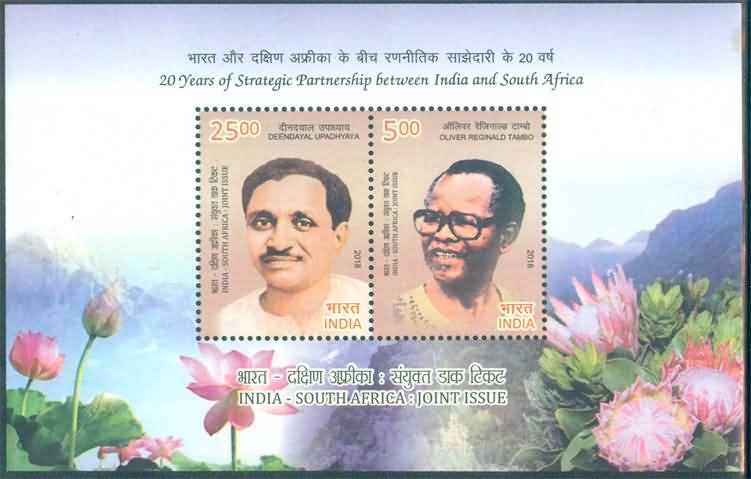India South Africa Joint Issue

Technical Data
| Stamp Set | 20 Years of India -South Africa Strategic Partnership |
|---|---|
| Date of Issue | June 7, 2018 |
| Denomination | Rs. 30 |
| Quantity | 110,000 |
| Perforation | 13¾ x 13¾ |
| Printer | Security Printing Press, Hyderabad |
| Printing Process | Wet Offset |
| Watermark | No Watermark |
| Colors | Multicolor |
| Credit (Designed By) | Smt. Alka Sharma |
| Catalog Codes |
Michel IN BL193 Yvert et Tellier IN BF180 Stanley Gibbons IN MS3509 |
| Themes | Anniversaries and Jubilees | Antiracism | Famous people | Human Rights | Joint Issues | Men | Optical Instruments | Politicians |
India’s relations with South Africa date back several centuries. India was the first country to sever trade relations with the apartheid Government in 1946. Diplomatic and consular relations with South Africa were restored in November, 1993. Since then India-South Africa relations have been growing from strength to strength. A number of bilateral agreements have been concluded between the two countries since 1993 in several areas including economic and commercial cooperation, defence, culture, health, human settlements, public administration, science and technology and education. The year 2018 marks 25 years of the establishment of diplomatic relations between India and South Africa, the 125th year of the Pietermaritzburg railway station incident involving Mahatma Gandhi, and the birth centenary of Nelson Mandela.
Under the IBSA & BRICS initiatives, both countries interact regularly at all levels. India is the fourth largest trade partner of South Africa. About 150 Indian companies have their presence in South Africa, with an estimated investment of around US $ 4 billion. The South African Indian origin community numbers around 1.5 million which constitutes about 3% of South Africa’s total population. South Africans of Indian origin are well-represented in government, business, media, legal and other sectors of public life. The year 2010 marked the 150th anniversary of the first arrival of Indians in South Africa. The year 2014 marked 100 years of Gandhi’s final departure to India from South Africa which date is commemorated annually as Pravasi Bharatiya Divas.
125th Year of Mahatma Gandhi’s Pietermaritzburg Station Incident:
Mohandas Karamchand Gandhi was born on 2 October, 1869, at Porbandar, a small town in Gujarat, on the sea coast of Western India. He studied initially at an elementary school in Porbandar and then at a high school at the nearby Rajkot. He sailed to England on 4 September, 1888 at the age of 18 and was enrolled in the Inner Temple. He passed his examinations and was called to the Bar on 10 June, 1891. An offer from Dada Abdulla compelled him to go to South Africa to instruct counsel in a lawsuit pending in a court chapter in the HS. In Africa, Gandhi had his first bitter experience of racial discrimination during his journey from Durban to Pretoria, where his presence was required in connection with the lawsuit.
On 7 June, 1893, Mahatma Gandhi was on his way to Pretoria sitting in the first class compartment of a train. When the train reached the Pietermaritzburg Railway Station in the evening, a white man objected to Gandhi’s presence in the compartment and complained to the railway authorities. Gandhi held a valid first class ticket. However, he was asked to move to the van compartment. Gandhi refused and was forcibly evicted and thrown out with his luggage. It was a cruel and humiliating experience. He was unceremoniously turned out of the carriage at Pietermaritzburg Railway Station. It was a bitterly cold night. He went on to sit and shiver on the station and pondered over what had happened and whether he should return to India or protest for his rights.
As fallout of the incident, Gandhiji made the momentous decision to stay on in South Africa and fight the racial discrimination against Indians there. From that hour, he decided that he will not accept injustice. Out of that struggle, emerged his unique version of nonviolent resistance, Satyagraha.
Birth Centenary of Nelson Mandela:
Nelson Rolihlahla Mandela was born on 18 July, 1918 in Mvezo, a village near Mthatha, Eastern Cape, South Africa. He was an anti-apartheid revolutionary, political leader and philanthropist, who served as President of South Africa from 1994 to 1999. He was the country’s first black Head of State and the first elected President in a fully representative democratic election. He served as the President of the African National Congress (ANC) party from 1991 to 1997.
In 1962, Mandela was arrested for conspiring to overthrow the state and sentenced to life imprisonment in the Rivonia Trial. After serving 27 years in prison, he was released on 11 February, 1990, nine days after the unbanning of the ANC. He immersed himself in official talks to end white minority rule and in 1991, was elected ANC President. In 1993, Nelson Mandela and President F.W. de Klerk jointly won the Nobel Peace Prize. On 10 May, 1994 he was inaugurated as South Africa’s first democratically elected President.
Mandela stepped down in 1999 after one term as President. He continued to be engaged in noble causes. He and his wife set up in 1995 and established the Nelson Mandela Foundation & The Mandela Rhodes Foundation. He died at his home in Johannesburg on 5 December, 2013.
Nelson Mandela first visited India in 1990 when he was honoured with the “Bharat Ratna” soon after his release from imprisonment. In March 1997, Nelson Mandela and Indian Prime Minister H.D. Deve Gowda signed the Red Fort Declaration on the India-South Africa Strategic Partnership during Mandela’s official visit to India. Nelson Mandela received the international Gandhi Peace Prize for social, economic and political transformation from Indian President K. R. Narayanan in 2001.
